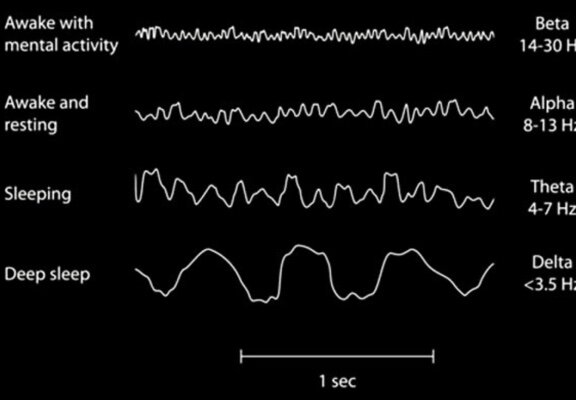
During sleep, the body moves through five different stages (beta, alpha, that, delta, REM). A sleep cycle is the progression through the various stages of NREM (non- REM) sleep to REM sleep.
Ideally, a sleep cycle occurs every 90-120 minutes resulting in four to five cycles per sleep time. A sleep cycle progress through the stages of non-REM sleep from light to deep sleep, then reverse back from deep sleep to light sleep. Brain waves during deep sleep are called delta waves due to the slow speed and large amplitude. Of all of the sleep stages, deep sleep is the most restorative
Sleep is regulated by several brain structures, neurotransmitters and neuromodulators. Endocannabinoids bind mainly to cannabinoid receptors CB1R and CB2R, thereby modulating several brain functions, (memory, mood, food intake, pain perception) regulating the sleep-wake cycle.
Endocannabinoids promote non-rapid-eye movement and rapid-eye-movement sleep by interacting with melanin-concentrating hormone neurons in the lateral hypothalamus.
Endocannabinoid signaling regulates sleep stability. Endocannabinoid signaling through CB1 is necessary for sleep stability but it is not necessary for sleep homeostasis. In other words, endocannabinoids aren’t necessarily needed in order to reach each stage of sleep, but they are necessary to help you stay within each stage longer for more restful sleep. This evidence appears to improve quality of sleep without impacting on total sleep time.
Studies have also found that these results are most effective for those who struggle with sleep disturbances.
Regular sleep deprivation significantly increases your risk for adverse health consequence. Sleep deprivation is a very serious public health issue. More than 50 million Americans suffer from over 80 different sleep disorders and another 20 to 30 million suffer intermittent sleep problems each year. Even beyond our borders, it’s so serious that the World Health Organization recently declared a global sleep loss epidemic.
Cannabinoids as a sleep aid is highly variable and many factors influence the outcome: the individual user, how it’s administered, the cannabinoid ratio and terpene profile, the timing and dosage, and the history and frequency of use.
